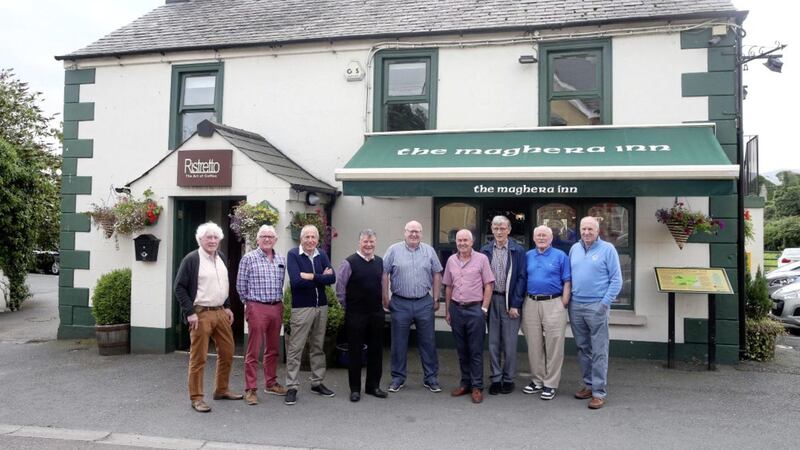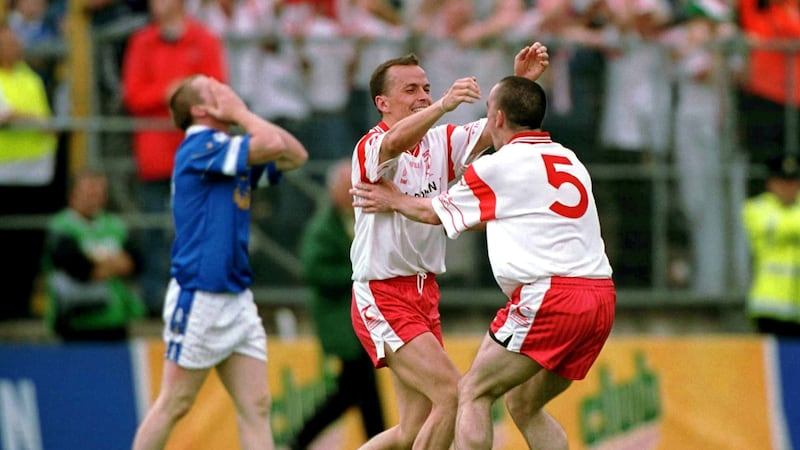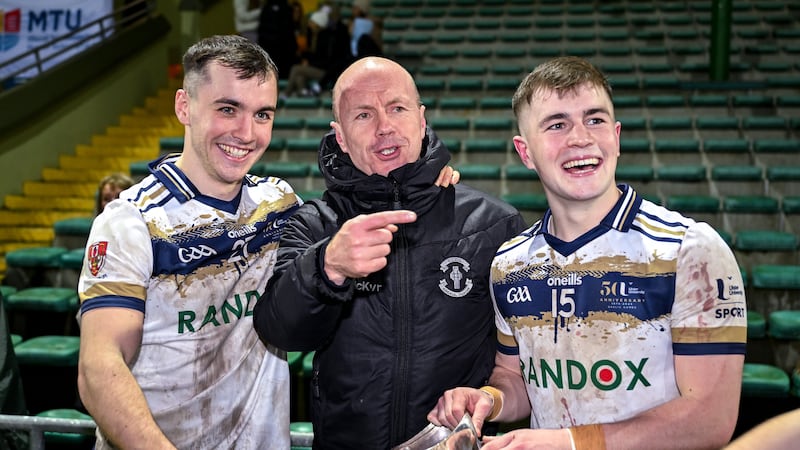ONE after another, the cavalry pulls into the car park. Colm McAlarney is the first to arrive, a couple of minutes before James Milligan lands with Dan McCartan and Dickie Murphy in tow.
Mickey Cole is next, appearing from the other side of the building, hands in pockets, his eyes narrowed as the harsh midday sun snakes between the trees overhead.
Another car comes into view as he crosses the tarmac.
“Och, there’s the child,” says Cole, crouching down to peer in.
The passenger side window drops slowly before a low drawl cuts through the quiet of a sleepy Tuesday afternoon.
“Jesus boys, youse are a sorry sight…”
Fifty years ago tomorrow, 18-year-old forward Peter Rooney was the youngest member of the Down team that stunned the mighty Kingdom to bring Sam Maguire back to the Mourne County for the third time in nine years.
He was one of a clutch of talented minors who, two summers previous, had suffered All-Ireland final heartache against Mayo before bouncing back in the most emphatic fashion imaginable.
‘Big Dan’, Sean O’Neill, Paddy Doherty and captain Joe Lennon - veterans of those era-defining 1960-’61 successes - provided the steady hand, while another group had emerged around the middle of the decade containing the likes of Milligan, Willie Doyle, Ray McConville, Danny Kelly and Larry Powell.
Fused together by manager Gerry Brown and trainer Des Farley, they formed an unstoppable alliance in that glorious summer of ’68.
So much has changed across half a century, yet what remains solid and sure is the bond that was there from the earliest of days.
As they mill around outside the Maghera Inn, the majestic Mourne Mountains looming large overhead, they aren’t meeting to celebrate their golden jubilee; they are meeting because it’s what they have done for years.
The faces may change from time to time, yet every month without fail a group of men who scaled Gaelic football’s greatest peak gather here for no reason other than to spend a few hours together, having the craic.
The company is easy, the conversation uninhibited, the slagging consistent.
It doesn’t go unnoticed, for example, that the great midfielder McAlarney – given the moniker ‘Arkle’ because of his marauding style – is sheepishly carrying a crutch after hurting his foot weeks before.
“It’s not a good look, is it?” he says with a laugh.
“You better be careful boy,” smiles Rooney, “you’ll be getting put down.”
Along with McCartan, the pair are soon standing over a picnic table, flicking through the newspaper file from the day they put Kerry to the sword.
Yards away, Milligan and Cole giggle like schoolboys as they scroll through recent WhatsApp messages.
“Have you seen this one?”
“What one’s that?”
“The one with the donkey...”
“Naw, you sent me the one about the Pope. Go ahead, bring it up there...”
It later emerges that, despite only being only 74, Milligan has invited them all to his 100th birthday, which he intends to bring forward to the next couple of years “so that everyone can be there”.
John Murphy, John Harte and Sean O’Neill are the last to arrive, and a couple of quick photos outside complete the formalities before the trip down memory lane can commence.
“Right boys,” calls Cole, rallying the troops, “suck in those bellies. We can’t be making a show of ourselves here.”
************************
FEBRUARY 4, 1968. A sheet of frost lay like a white carpet in the shade of the stand at Pairc Tailteann. Thick black smoke blew across the pitch from a fire being burned somewhere in the vicinity of the famous old ground.
Welcome to the home of Meath - defending All-Ireland champions and providers of the ultimate sink or swim test for a Down collective still finding its feet
The previous summer a Mourne outfit in transition had lost its provincial crown when well beaten by Cavan in the Ulster final. What direction they took from that point would be critical.
In came six of the 1966 minors – Peter Rooney, Mickey Cole, John Murphy, Colm McAlarney, John Purdy and Brendan Sloan – to bolster the ranks.
They soon found themselves thrust into the deep end. A trip to Navan was not for the faint-hearted but Down had taken encouragement from a draw with the Royals in Newry seven days earlier.
Going behind enemy lines, however, was another matter entirely.
Yet after a bruising encounter, the Mournemen came back up the road with a five point win and a place in the knock-out stages of the National League.
More importantly, though, they came back up the road with the belief that anything - absolutely anything - was possible...
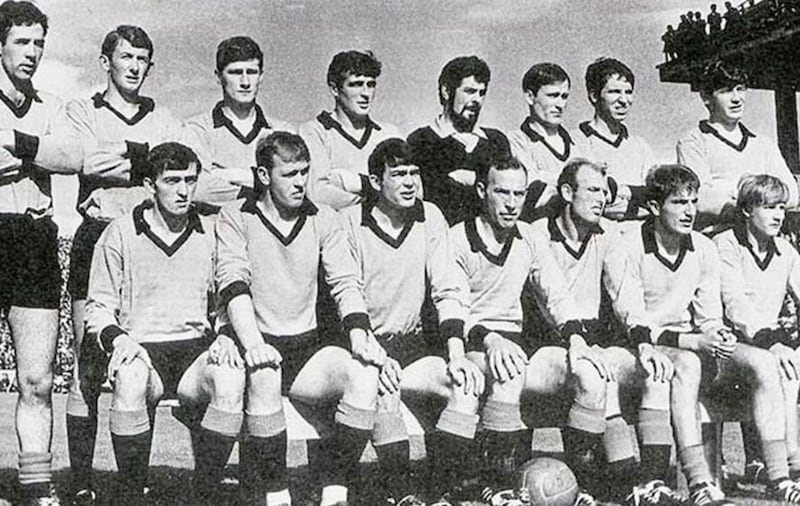
Neil Loughran: Sean, Dan you were both there in ’60 and ’61. At what point did you realise something special could happen with the group that had come together in 1968?
Sean O’Neill: You never know starting off a League campaign but, in the life of every team, there’s a turning point - Navan was a very clear turning point for that team. Meath were tough but here was a young Down team and we came away from that knowing we could compete at that level.
Colm McAlarney: Those were two real baptisms of fire...
John Murphy: We actually played them a third time in that League as well, in the quarter-final in Croke Park, and we beat them by a point that time.
Neil Loughran: But Meath were seen as the benchmark?
Colm McAlarney: They were very tough and worthy champions, so it was going to give you confidence that you were able to stay with them first of all, and then to actually beat them in those critical games. Those three games were crucial in terms of building the confidence of that team, the belief and gelling that group together.
John Murphy: My first contact with Meath was one of those things you never forget. I remember ‘Red’ Collier muscling into me, just to let me know he was there.
It was a big wake-up call after coming from minor football where you’re playing against your own age group and your own peers. But we all just had to get used to it.
Peter Rooney: The first tournament I played was against Galway in a grounds tournament in 1966. Our taxi driver, Terry McAnulty, came to me and said ‘you’ve to bring your boots tomorrow’. I was 17. I went in and next minute ‘there’s a jersey, tog out, centre half-forward’.
I was marking Sean Meade, and I remember walking up to him and he said ‘are you the minor?’ I said ‘yeah’ - next minute, bang.
Then I went into the square and Noel Tierney caught me. You know the way in comic books or in cartoons you see stars? That was me. I didn’t know where I was.
Neil Loughran: Welcome to senior football then! Even with that relative inexperience among the ranks, Down went on to win the League. That was some marker to lay down...
John Murphy: I’ve heard it said a number of times in the past that the ’68 team came in under the radar to win the Championship, but we didn’t really. We’d made our presence felt earlier on in the year by going unbeaten in the League, so everybody was well aware what our make-up was.
Neil Loughran: And for you boys who came onto the team from that minor side, it must have been an amazing experience to find yourselves lining out alongside men you had watched win All-Irelands not so many years before?
Mickey Cole: It was fairytale stuff to me; just amazing that it happened so quickly. I mean, in 1960 and ’61, we were schoolboys. Sean laughs at this, but he was my hero. To get playing with those boys in 1968, and getting to an All-Ireland final with them...
Peter Rooney: He’s getting emotional now...
Mickey Cole: I’m not getting emotional. I give Sean plenty of slagging but I want to give him a bit of credit too.
Colm McAlarney: I was at the ’61 All-Ireland final as a schoolboy. I remember they were worried about the crowd because it was enormous, and people were being passed over the fence, including myself. I was standing there alongside hundreds of others along the sidelines, and you could actually hear how tough a game that was between Down and Offaly.
Sean O’Neill: You’re not wrong there!
Colm McAlarney: If someone had told me that in six or seven years’ time I would be playing alongside these lads, you just wouldn’t have believed it.
John Murphy: You have to remember, these men were acclaimed throughout the length and breadth of Ireland. No team had brought the Sam Maguire across the border until they did. It was an awe-inspiring thing.
James Milligan: What helped us a whole lot in getting to know each other was when we went to play Dublin the day before the All-Ireland hurling final in 1967. We got tickets for the game so we booked into a hotel that Saturday night.
We were all mixed up, it wasn’t east Down-south Down, it was just a crowd of boys in together. I was bunked in with John Purdy – never spoke to the fella in my life, except on the field, but then for years after that we were right and thick. The craic was good.
Somebody left Joe’s shoes outside I remember…
Colm McAlarney: There’s reverence for you!
Neil Loughran: You mentioned Joe Lennon there. Would it be fair to say that, as captain, he maybe had a different relationship with the younger players than some of the other experienced men still there?
Peter Rooney: Joe would’ve been a bit more aloof. Not in a bad sense, but he wouldn’t have been slagging and carrying on the way these boys would. Joe would’ve been more serious.
Mickey Cole: I remember Joe got us to take stones off the mountain to put into his car and take back to Gormanstown. He was building a fireplace or a wall or something. I don’t know how many trips he made.
Colm McAlarney: That was an early lesson in strength and conditioning! Joe was just a different type of character to, say, Paddy. Paddy was a real prankster, and related to our group very well.
Mickey Cole: Paddy was a practical joker. On the day of an important match you’d have gone into your bag to get your boots and they’d have disappeared - Doherty had maybe thrown them into the shower or something.
Colm McAlarney: The only time Paddy would’ve got a bit serious was as you were exiting the dressing room. I always remember, just as you were about to walk out on to the field, his parting shot would have been: ‘Remember boys – long journey home bate…’
************************
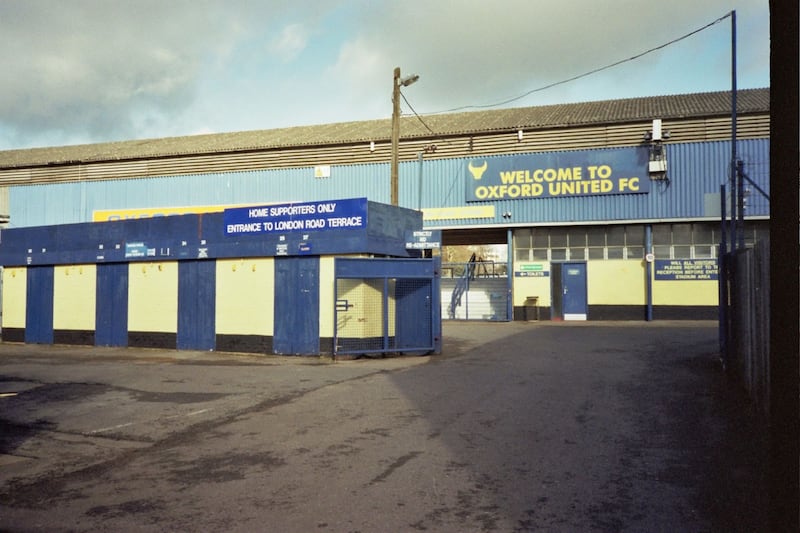
THE Manor Ground, home of English third division side Oxford United - not exactly the kind of place you expect to find two teams with All-Ireland ambitions on the eve of the Championship.
“I’ve no idea what the thought process was there, I really don’t,” says Colm McAlarney, shaking his head.
The Mournemen had beaten Kildare in the final of the National League on May 27. Their provincial campaign was to begin against Derry on June 9.
Somewhere in that 13-day period between those two huge games, they found themselves bound for England to face Offaly. On a soccer pitch.
“My mother was telling all the neighbours I was away to Oxford,” smiles Mickey Cole, “she had never been so proud.”
“Imagine playing on Oxford United’s soccer pitch, which was very small, against that Offaly crowd who had an axe to grind with these boys,” adds McAlarney, nodding towards Sean O’Neill and Dan McCartan, both part of the Down side that had defeated the Faithful men in the 1961 All-Ireland final.
“That was brutal that match – a really dangerous game prior to the start of the Championship.”
“I remember going over to Brendan Sloan before throw-in and warning him to watch himself against their corner-forward, who was a real rough customer,” explains O’Neill.
“After about 10 minutes I looked around and your man was lying on the ground. I asked Brendan what happened and, in that real thick Mourne accent, he told me: ‘He hit me a boot up the arse so I smacked him.’
“Brendan wasn’t the biggest but he was hard as nails. Pure Mourne granite.”
With Derry up next, a tempestuous encounter that would go down in legend as ‘the battle of Ballinascreen’, things didn’t get any easier.
But Des Farley had them flying fit and, with the League title already in the bag, there was an air of quiet confidence around the panel.
Any complacency, though, would be quickly nipped in the bud.
“I remember Sean chastised me on the Thursday night before the game against Derry,” recalls Cole.
“He came over to me in the dressing room and said ‘how do you think we’ll get on this Sunday Mickey?’ I said I think we’ll beat them handy enough Sean...”
At that, Cole slams the table with his fist to recreate the scene as curious diners look up from their lunch.
“Stop that! Sean said. Get that out of your mind right away! We’ll win, he said, but we won’t win easy.”
“How prophetic was that?!” laughs McAlarney, “it was anything but easy – an absolute war at times, but we got through it.
“We beat Cavan comfortably in the Ulster final – they looked upon as upstarts probably, usurpers of their tradition, so they were always ready. Galway still had a kick in them then but we got over them in the semi-final.
“All of a sudden you were getting ready for an All-Ireland final against the mighty Kerry. By that stage we’d had four tough games at Croke Park through the year and, even though we were a relatively young side, we were quite a battle-hardened outfit, fit for anything that came at us...”
************************
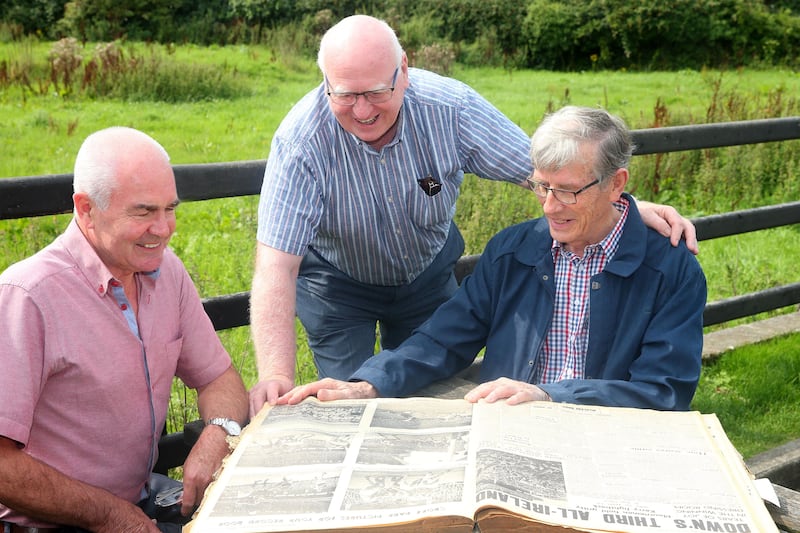
“The referee’s checking his watch annnnd... the game is on. The first to get it are Down, this is James Milligan with the ball... Milligan, 70 yards out from the Kerry goal, right down into full-forward Sean O’Neill... Sean O’Neill with the ball 20 yards out... it’s high... and it’s a point! Well that’s the quickest start we’ve seen to an All-Ireland final in a long time, a point by Sean O’Neill after 10 seconds of play...”
Michael O’Hehir, RTE
Neil Loughran: September 22, 1968 – the big day itself. The build-up to the All-Ireland final was something that was so new for quite a few of the players on that Down team. How did you deal with it?
Mickey Cole: It’s funny, but one of the main things I remember is two weeks before the All-Ireland final we played a challenge match against Dublin in Newcastle and they beat us. We were very despondent in the dressing room afterwards.
Colm McAlarney: But it was probably a good thing...
Peter Rooney: Probably. The older guys kept a lid on things. In a way we were protected from a lot of the hype. At training we all got together and spoke. We had self belief, and it was an exciting time. We were encouraged to believe in ourselves.
Neil Loughran: There’s always been a fascination with Kerry, and it was no different back then. They had the likes of Mick O’Dwyer and the great Mick O’Connell among their ranks…
Peter Rooney: I remember you saying you’d never heard of Mick O’Connell?
James Milligan: Well, I’d heard of him. I knew the name but that was about the height of it.
Colm McAlarney: I remember reading some of the papers before it, and that was probably a mistake because I kept noticing these stories coming up from Kerry. In one the image was of people on a pier somewhere, waiting for this guy rowing across from Valentia Island – rowing himself! – and it was Mick O’Connell. If you had been reading that and digesting that, you could have thought you weren’t going to be playing a human being here, you’re going to be playing Cuchullain or something...
Neil Loughran: Yourself and James were up against him and Mick Fleming in midfield that day. What was the conversation before the game?
Colm McAlarney: Funny enough, James and I, right from the beginning, just had a telepathic understanding. Honestly, we wouldn’t have had that chat.
James Milligan: We did switch the jerseys though…
Colm McAlarney: That’s right! Because we were both of a similar frame we switched them around so if I was listed in the programme at number eight, I’d put on number nine. The commentator, poor old Micheal O’Hehir, if you listen to the broadcast of that All-Ireland final, very often James will be on the ball and he’ll be saying ‘Colm McAlarney’s coming up the field…’
James Milligan: Sure we were at a funeral not so long ago and a fella who would’ve known us back then came up to me and said ‘well Colm, how are you?’
Colm McAlarney: Haha. But no, there was no such thing as Gerry Brown coming over to us and saying ‘look, you’re playing against this legend Mick O’Connell on Sunday, you have to be thinking this way’ or whatever. In his own quiet way, he gave us total belief to go out and play our own game.
James Milligan: Just before the last training session, Jarlath [Carey] was up, PJ [McElroy] was up, they played midfield against Kerry before and they were saying ‘you have to get in and do this and do that’, but we were a different shape to them.
Gerry asked ‘what way are you gonna play it?’ and I remember Colm saying ‘just leave it to us, we’ll sort something out’. We said then we’d just play our own game, and take whichever one’s nearest us, [Mick] Fleming or O’Connell. That was it, and I think that’s what made it easier for us. Everywhere else, Mick O’Connell would’ve been marked tight so he didn’t have to look for his man, he knew his man was going to be beside him. But because I would’ve taken him up, or Colm would’ve taken it up, it would have given us that wee bit of an advantage.
Neil Loughran: Down made a blistering start, 2-7 to 0-5 ahead at half-time. Kerry tried, but there was no coming back from that...
Colm McAlarney: It was an absolute blitzkrieg – we just hit the ground running, and really that probably summed up our year. It was a blend of youth and experience coming together to create the perfect storm.
Peter Rooney: We also had the plan…
Colm McAlarney: That’s right. We had the plan.
Neil Loughran: What was the plan?
Peter Rooney: The plan was the creation of space
Sean O’Neill: The diamond…
Peter Rooney: We would stretch them, play off the sidelines, play off the end-line and stretch the backs. So the back had to think about it, that if you got around him you’d created that space for fellas to run into.
Mickey Cole: Sean probably won’t agree with me but, after ’66 or ’67, he went into full-forward. In the old days the full-forward stood beside the full-back – Sean was the modern-day full-forward. He didn’t stay on the edge of the square, he came out and drew the full-back with them. You weren’t static in front of the goals…
Sean O’Neill: I wasn’t the first one to do that Mickey, but what we had was the diamond. So the opposing goal’s there, the diamond came from there to there, to there to there – no-one went into that before the ball came. You moved around it – Peter could come over here, I could go out there, but always the space was there for the man down the field to run into.
Colm McAlarney: It worked an absolute treat right through that whole year. It’s nearly unstoppable.
Peter Rooney: If Sean had gone out, I’d have gone in, same with Purdy, whoever was in there.
Sean O’Neill: There was movement all the time, and that was very unsettling for a defence.
Mickey Cole: And they’d have been wondering where Paddy ‘Mo’ was...
Colm McAlarney: Paddy would have swept out around the middle, collected ball in that area too. Paddy, as well as being so accurate from play for scores, was also a superb passer of the ball.
Sean O’Neill: The brief for the half-backs was to breach the half-forward line. Generally the best defenders on a team were half-backs – they were usually the tightest, hardest markers and we neutralised them.
Colm McAlarney: That was just night after night training in Castlewellan, teams being picked, backs against forwards, and loads of football played. Instinctively, spontaneously, naturally, you got to know just playing a couple of hours at night, until it got dark. You got to know and understand each other.
************************
“YOU know, I can remember everything about it. I can even remember who was number one in the charts at that exact time…”
There are puzzled looks around the table as eyes dart back and forth, searching for inspiration.
“Does anybody else remember?” prompts Cole again. More blank faces.
“That wee Welsh girl?”
“Who? Cilla Black?”
“She was from Liverpool…”
“Mary Hopkins boys!” laments Cole before clearing his throat.
“Those were the days my friend, we thought they'd never end, we'd sing and dance, forever and a day…”
Kerry vanquished, All-Ireland champions for the third time that decade, careers stretching out in front of them, for that moment in time they felt like kings of the world. Those were the days alright.
Little did they know it would never get so good again…
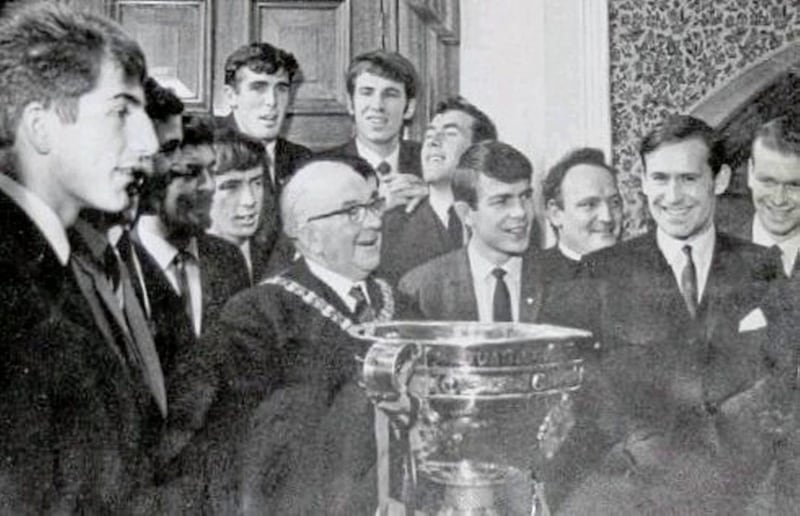
Neil Loughran: Tell me about that journey back up north…
Dickie Murphy: You’d no motorway then, so it was long. Very long.
Mickey Cole: We stopped in Drogheda, in Gormanstown, there was a meal in Newry at the Ardmore Hotel, then we went home via Warrenpoint, then Rostrevor, Mayobridge, Hilltown, Castlewellan, Downpatrick.
Peter Rooney: If you came from this end of the county, you didn’t get home…
Colm McAlarney: I remember finishing up in the Donard Hotel in Newcastle, and it was basically a breakfast. You were looking out the window, five o’clock in the morning, and seeing people still out on the Main Street. So I suppose you begin to realise what an impact winning an All-Ireland has on a county, and on the psyche of a county.
James Milligan: That was the early hours of Tuesday wasn’t it? I had to go to work that morning.
Neil Loughran: Doing what?
James Milligan: Delivering coal.
Mickey Cole: People had to get their coal.
Neil Loughran: There aren’t not too many coalmen playing football these days…
Colm McAlarney: I remember Tomas O Se quoting a fella who played for Kerry way back in the ’40s; Paddy ‘Bawn’ Brosnan you called him. And he said ‘what you need for an All-Ireland winning Kerry team is a few farmers, a few fishermen, and a college boy to hit the frees’.
Peter Rooney: Haha. I must tell Paddy Doherty that.
Neil Loughran: A couple of days after that homecoming, you became the first Gaelic football team to receive a civic reception at Belfast City Hall. The team was welcomed by unionist Lord Mayor William Geddis, but the reception wasn’t all friendly...
Mickey Cole: Ian Paisley’s wife was there, she was a councillor at the time.
Neil Loughran: You didn’t see the big man himself?
Mickey Cole: I think we just missed him. There was a protest out the front and he arrived just as we were being shepherded out the back door.
Peter Rooney: Even so, that was a really big step at the time.
Colm McAlarney: Oh it was, though the thing I remember of that day was the Dungannon march. It must have happened just prior to us going to City Hall, and Gerry Fitt was there with a real shiner of a black eye. We were maybe cocooned away from all of that, but I remember thinking then ‘things are starting to get a bit serious...’
Neil Loughran: You were probably in a world of your own that whole year...
Mickey Cole: Oh you were. The whole thing was whirlwind stuff. I was the last of the six minors to come on to the team and to go through that whole year undefeated… then we went to America two weeks after winning the All-Ireland. Two days after getting back from America we played an Australian Rules team at Croke Park. We played Kerry at Wembley in the May of ’69 then, the weekend after the FA Cup final. That’s a lot to happen young lads in in the space of basically a year-and-a-half.
Peter Rooney: We were actually invited to Australia but the county board put the kaybosh on it. I thought if we’d gone in that spring of ’69, it would’ve galvanised us. Unfortunately, after winning the All-Ireland in ’68 we were feted, not only throughout our own county but, honest to God, you were invited to places like Ardboe, Moortown, Fermanagh, through the whole winter. So you lost your focus for a bit, but I think if we’d gone to Australia for three weeks…
James Milligan: It would’ve wrecked us…
Colm McAlarney: Haha, probably. It might have bonded us but it mightn’t have done us any good.
Peter Rooney: Half of us probably would’ve stayed there.
Neil Loughran: It didn’t work out in ’69, and that Down team would never reach those heights again. How much of a source of regret is that?
Sean O’Neill: There was definitely two All-Irelands in that team.
James Milligan: Things just weren’t right. The hunger, the focus we had the year before, it wasn’t there for whatever reason. I remember Sean saying before the Ulster final Sean said ‘who are we playing on Sunday?’
Mickey Cole: Fair play Sean, you had realised.
Colm McAlarney: There’s no doubt there was more in that team. Had there been a back door system as there is now...
Cavan ambushed us in the final that year. Despite Sean’s warnings to us prior to that game, we weren’t mentally set for that, and you had to be for Cavan. I recall coming off the pitch at Casement devastated that we’d been beaten. I looked up and standing there with broad grins on their faces were Mick O’Dwyer, Donie O’Sullivan and Denis O’Sullivan who had travelled all the way up from Kerry.
They were delighted we were gone. That same Kerry team that we had beaten in ’68, with pretty much the same personnel, won the next two All-Irelands.
Neil Loughran: Some of that team started to drift away too…
Colm McAlarney: John Purdy was a free spirit in many ways but a wonderful footballer, and had he still been around in the early Seventies I could’ve seen him moving into a position like centre half-forward. And then James…
James Milligan: I didn’t quit. I was on the subs’ bench in ’71…
Colm McAlarney: I find that astonishing.
James Milligan: That year I got a wee letter just to tell me training starts on the third of October, all members are expected to attend. Then I looked down at the bottom of the letter where it said ‘PS, as you are no longer on the panel, it is not necessary for you to attend’.
Colm McAlarney: It’s just unbelievable, isn’t it?
Peter Rooney: You’re lucky you got that!
James Milligan: Remember the Ulster medals you got? I didn’t get one for ’71 either. The boys got me the ’68 Ulster medal, I think I got that six or seven years ago, but I still don’t have a ’71 medal.
Sean O’Neill: It still sticks in my craw that the medals we have from ’68 say ‘Kerry v Down’ instead of ‘Down v Kerry’. I actually raised it with [former Down chairman] Paddy McFlynn but nothing was ever done about it.
Mickey Cole: I remember in ’71 Paddy Doherty was player-manager. I got married that year and I wasn’t picked for the All-Ireland semi-final against Galway, but after half-time things weren’t going well and Paddy told me get warmed up. I was getting ready to come on and Paddy turned round to me and says ‘actually Mickey, I’m going to put myself on’.
Colm McAlarney: Mickey did the warm-up for Paddy.
Mickey Cole: I’m still warming up!
Laughter breaks out for the umpteenth time as afternoon turns to evening. Absent friends are toasted and talked about with fondness as though still here in the middle of it all.
“This, us here today, is a reflection of what it was like in those days,” says John Murphy. “We were a team, we looked after one another. There’s a bond there.”
“There’s a massive bond,” adds McAlarney. “It’s probably the same with every team that wins an All-Ireland. It’s a lifelong bond – these are like brothers.”
“That said,” chips in Cole, eyes full of mischief once more, “Dan and Sean are still pretty lucky to be invited along with us…”
Conversations carry on out the front and in the car park, just where they had begun hours earlier, before everybody heads off in different directions.
Until next month, of course. Same time, same place. Same as it ever was.
************************
DOWN 1968
Panel: Danny Kelly, Brendan Sloan, Dan McCartan, Tom O’Hare, Ray McConville, Willie Doyle, Joe Lennon, James Milligan, Colm McAlarney, Mickey Cole, Paddy Doherty, John Murphy, Peter Rooney, Sean O’Neill, John Purdy, Larry Powell, George Glynn, Hilary McGrath, Dickie Murphy, Val Kane, Paddy Turley, Mickey Daly, Patsy McAlinden
Manager: Gerry Brown; Trainer: Des Farley; Selectors: TP Murphy, George Lavery, Bertie Lecky; Doctor: Dr Martin Walsh; Masseur: Jimmy Hooks; Kit man: Bobby Langan
